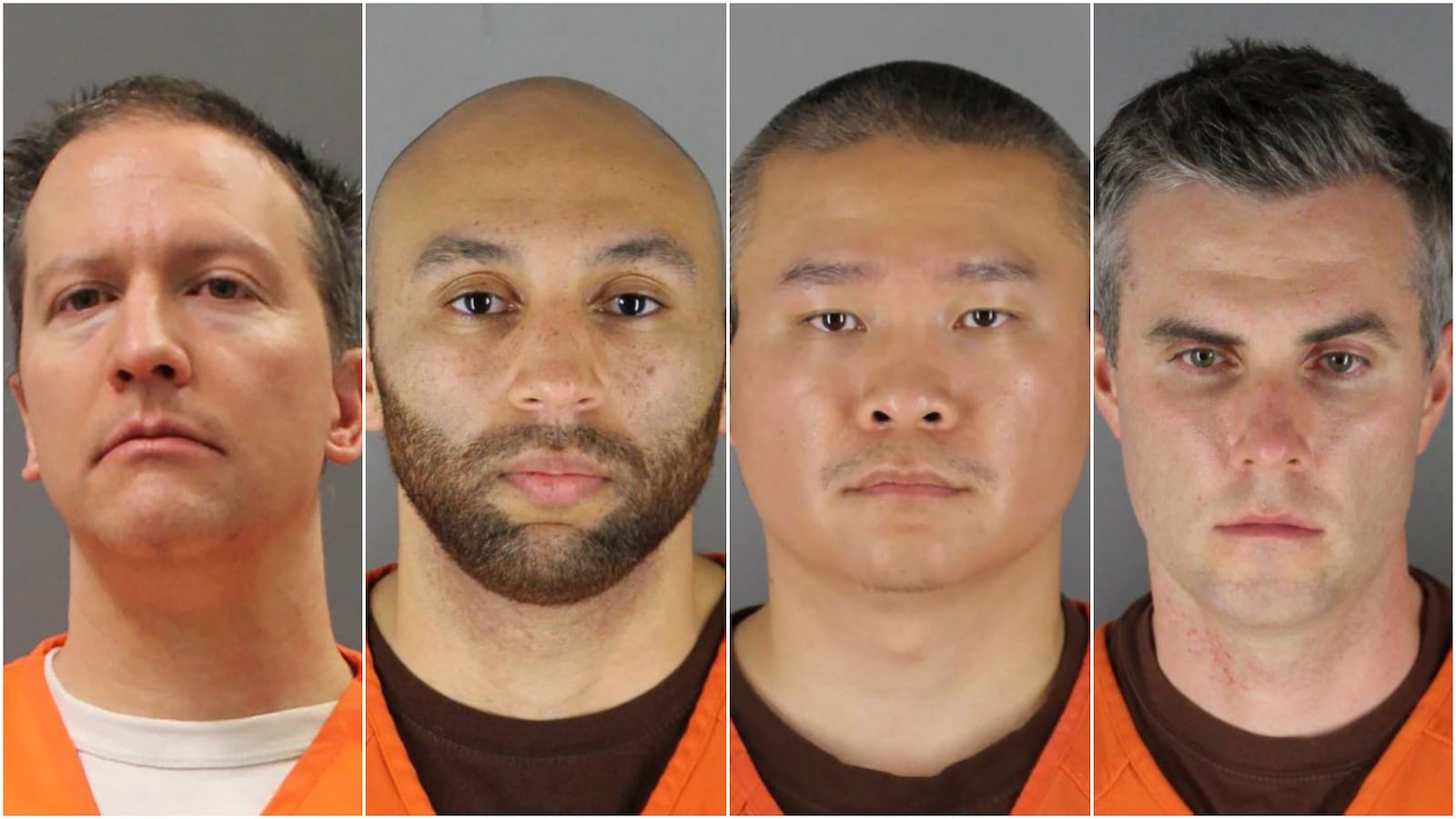The four former Minneapolis Police officers involved in George Floyd’s death will face another trial after a federal grand jury indicted them on Friday for civil rights violations.
The officers—Derek Chauvin, Tou Thao, Thomas K. Lane, and J. Alexander Kueng—have been indicted for deprivation of rights while acting as law enforcement officers. The officers violated Floyd’s right to be “free from unreasonable seizure” and excessive force, the indictment, unsealed on Friday, says. It also charges them with failing to provide Floyd with medical care during the May 25, 2020 arrest.
“The three-count indictment alleges that all four defendants, while acting under color of law, willfully deprived Mr. Floyd of his constitutional rights,” the Department of Justice said in a press release. The maximum penalty for Friday’s charges is life in prison.
The indictment, stemming from a Justice Department investigation into Floyd’s death, comes just weeks after Chauvin was convicted of second-degree murder, third-degree murder, and second-degree manslaughter. The three other ex-cops are facing trial in August on separate charges of aiding and abetting Chauvin. The new federal charges mean all four will face an additional trial in relation to Floyd’s death.
Jonathan Smith, the executive director of the Washington Lawyers’ Committee for Civil Rights and Urban Affairs, told The Daily Beast that while he was not shocked by Friday’s indictments, it was “unusual” to file them before Chauvin’s sentencing in June.
“Clearly this stems from a decision that this case has enough federal interest and is important in the landscape of the country that it was time to step in now,” Smith said. He speculated that Chauvin’s colleagues may soon start looking for plea deals, and the DOJ “must be feeling pretty confident.”
“I don’t know what’s going through the defense counsels’ mind at this point. The federal charges on top of the state charges do provide some additional incentive to try to find a global solution because even if they do find a way to be successful in the state case—they still have the federal case,” he said.
Friday’s indictment alleges the four officers “saw George Floyd lying on the ground in clear need of medical care, and willfully failed to aid Floyd, thereby acting with deliberate indifference to a substantial risk of harm to Floyd.”
It also charges Thao and Kueng separately, alleging that they were aware that Chauvin was holding his knee on Floyd’s neck as Floyd was handcuffed and not resisting. They “willfully failed to intervene to stop Defendant Chauvin’s use of unreasonable force,” the indictment says. In a gut-wrenching video that went viral last year, Floyd can be heard begging for his mother and saying “I can’t breathe” multiple times.
Chauvin has also been charged in a second indictment, unsealed on Friday, stemming from his 2017 arrest of a 14-year-old boy, in which he used a similar neck restraint.
The second indictment accuses him of “willfully depriving” the boy after he held him “by the throat” and hit him multiple times in the head with a flashlight. Chauvin also held his knee on the boy’s back and neck while the boy was handcuffed on the ground.
Last November, prosecutors asked a judge to allow them to show footage of the boy’s arrest in Chauvin’s 2021 trial—as proof of an apparent pattern of violence—but they were denied. The footage, they said at the time, began after Chauvin and a colleague responded to a domestic assault call. It shows the cops yelling at the teen, who was on the floor on his phone, to get up because he was under arrest.
When the boy refused, Chauvin hit him in the back of the head at least twice and grabbed him by the throat, prosecutors said. He then put the boy in a prone position for about 17 minutes—despite pleas that he couldn’t breathe and his mom’s attempt to intervene—until paramedics arrived.
Floyd’s family lawyers applauded the indictments on Friday, saying that it “reinforces the strength and wisdom of the United States Constitution” after “hundreds of years of American history in which Black Americans unfortunately did not receive equal justice.”
“We are encouraged by these charges and eager to see continued justice in this historic case that will impact Black citizens and all Americans for generations to come,” the statement said.
Minnesota Attorney General Keith Ellison said in a Friday statement that the state is still planning to prosecute Kueng, Lane, and Thao in August for the aiding and abetting offenses. Friday’s indictments are also separate from a Justice Department investigation into the City of Minneapolis and the Minneapolis Police Department that Attorney General Merrick Garland announced on April 21.
“The federal government has a responsibility to protect the civil rights of every American and to pursue justice to the fullest extent of federal law,” he said. “Federal prosecution for the violation of George Floyd’s civil rights is entirely appropriate, particularly now that Derek Chauvin has been convicted of murder under Minnesota law for the death of George Floyd.”
Floyd was arrested on May 25, 2020, after using a suspected fake $20 bill at a convenience store. His final pleas of “I can’t breathe” became a rallying cry around the world, re-energizing the Black Lives Matter movement and prompting a new reckoning on race and police brutality.
“Chauvin held his left knee across George Floyd’s neck, and his right knee on Floyd’s back and arm, as George Floyd lay on the ground, handcuffed and unresisting, and kept his knees on Floyd’s neck and body even after Floyd became unresponsive,” says the Friday indictment.
During Chauvin’s four-week trial, prosecutors argued he “betrayed” his badge when he ignored Floyd’s pleas for help and used excessive, deadly force that was not part of his training. Chauvin’s defense that he didn’t cause Floyd’s death and was acting reasonably in a chaotic situation was ultimately rejected by a jury.








